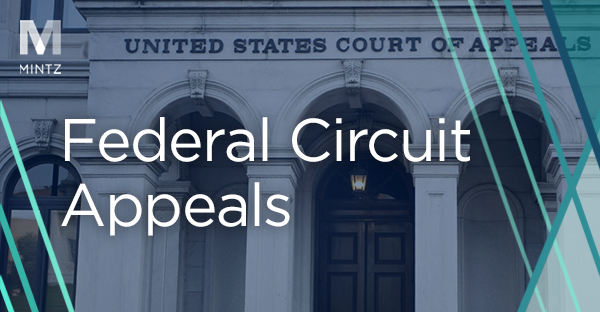
Patent Litigation
Viewpoints
Filter by:
District of Delaware Recites Policy Rationale for Dismissing Willful and Indirect Infringement Claims for Failure to Plead Pre-Suit Knowledge of Infringement
April 5, 2021 | Blog | By Adam Samansky, Peter Cuomo, Joe Rutkowski
On March 24, 2021, U.S. District Judge Colm F. Connolly of the District of Delaware, granted a defendant’s motion to dismiss claims for contributory and induced infringement and enhanced damages under 35 U.S.C. § 284 because the complaint alleged knowledge of the asserted patents solely based on averments in prior original and amended complaints in the same lawsuit.
Read more
Good News/Bad News: Patent Owners and Petitioners Both Make Gains in CAFC Uniloc Decision
March 31, 2021 | Blog | By William Meunier, Sean Casey
The Federal Circuit’s recent Uniloc 2017 v. Facebook Inc. decision is a mixed bag of good and bad news for both patent owners and inter partes review petitioners. On the plus side for patent owners (but not for petitioners), the Federal Circuit determined that the so-called “No Appeal” provision does not necessarily apply to 35 U.S.C. § 315(e)(1), and, therefore, a patent owner may still appeal a Patent Trial and Appeal Board determination that a petitioner is not estopped from maintaining an IPR under § 315(e)(1).
Read more
Doctrine of Assignor Estoppel to be Reviewed by U.S. Supreme Court
February 25, 2021 | Blog | By Christina Sperry, Monique Winters Macek
On January 8, 2021, the U.S. Supreme Court agreed to hear a case calling for it to abolish or limit the doctrine of assignor estoppel. See Minerva Surgical, Inc. v. Hologic, Inc., et al., No. 20-440, 2021 WL 77248 (U.S. Jan. 8, 2021). Mintz previously discussed the Federal Circuit’s decision, which found assignor estoppel to be applicable.
Read more
Copy Cats II: Nexus of Copying Required to Substantiate Non-Obviousness
February 17, 2021 | Blog | By Ken Jenkins
On January 28, 2021, the Federal Circuit affirmed the general principle that the mere fact of copying by an accused infringer is insufficient to rebut a charge of obviousness (L’Oreal USA, Inc. v. Olaplex, Inc.; appeal from PGR2018-00025; non-precedential).
Read more
Federal Circuit Says Automated Systems Are Not Abstract when Tied to Improvements
February 9, 2021 | Blog | By Michael Van Loy, F. Jason Far-hadian, Mark Hammond
It is now over 10 years since the Bilski decision was handed down by the United States Supreme Court. In that decision and several other decisions that followed (i.e., Mayo, Myriad, and Alice), the Supreme Court pronounced patent claims directed to abstract ideas not eligible for patent protection.
Read more
Year in Review: The Most Popular IP Posts of 2020
January 14, 2021 | Blog | By Christina Sperry
As 2021 begins and intellectual property (IP) strategies are being developed for the new year, it is a good time to reflect on what IP issues were prominent in 2020. According to many readers, hot topics included Chinese foreign filing licenses, patenting involving either artificial intelligence (AI) or COVID-19, inter partes review, and attorney fee awards.
Read more
Is This Seat Taken? A Chinese IP Court Proclaims Its Authority to Declare Global FRAND Terms
December 7, 2020 | Blog | By Michael Renaud, James Wodarski, Matthew Galica
A Chinese Court recently decided that it has the willingness, and jurisdiction, to set a global licensing rate that is fair, reasonable, and non-discriminatory (“FRAND”) for standard essential patents (“SEP”).
Read more
No Pleading, No Problem: Court Denies Motion to Dismiss and Bifurcates Willful Infringement Determination, in Absence of Affirmative Willful Infringement Claim
November 13, 2020 | Blog | By Adam Samansky, Peter Cuomo, Joe Rutkowski, Courtney Herndon
Recently in Nike, Inc. v. Skechers U.S.A., Inc., 2:17-cv-08509 (C.D. Cal.) (October 26, 2020), the U.S. District Court for the Central District of California granted-in-part and denied-in-part Defendant, Skechers U.S.A., Inc.’s (“Skechers”), motion to limit Plaintiff, Nike, Inc.’s (“Nike”), claim seeking attorney’s fees related to the infringement of its eight asserted design patents, resulting in the bifurcation of the willfulness issue from the trial on the merits.
Read more
Recreating the Prior Art
October 7, 2020 | Blog | By Andrew D. Skale
In high-stakes litigation, parties go to great lengths to prove their case. One such example is ongoing litigation between two giants in the paint and coatings world. Sherwin-Williams Co. and PPG Industries, Inc. are involved in a patent infringement dispute over BPA-free can coatings.
Read more
Joinder to the Rescue: Federal Circuit holds that joinder of instituted IPRs does not result in estoppel under § 315(e)
October 6, 2020 | Blog | By Peter Cuomo
In Network-1 Techs., Inc. v. Hewlett-Packard, No. 18-2338, the Federal Circuit reversed and vacated multiple aspects of the district court’s final judgment holding that Hewlett-Packard (HP) did not infringe U.S. Patent No. 6,218,930 (“the ’930 patent”) disclosing an apparatus and method for remotely powering Ethernet compatible equipment.
Read more
Another One Bites the Dust – N.D. Tex. Dismisses Antitrust Claims re FRAND Commitments with Prejudice
September 17, 2020 | Blog | By Michael Renaud, Joseph Miller
In the latest decision addressing antitrust liability for FRAND commitments, Judge Barbara M. G. Lynn of the Northern District of Texas dismissed a complaint from Continental Automotive Systems, Inc. (“Continental”) alleging, inter alia, violations of §§ 1 and 2 of the Sherman Act, and declaratory judgment as to FRAND obligations against Avanci, LLC (“Avanci”) and various members of its patent pool (collectively, “Defendants”).
Read more
THE SEP WORLD IN BALANCE: UK Harmonizes with Germany’s Rejection of Implementer Hold Out
August 26, 2020 | Blog | By Michael Renaud, James Wodarski, Daniel Weinger, Matthew Galica
Another major development in global standard essential patent litigation was handed down today, as the UK Supreme Court upheld lower court rulings that forced an efficient infringer of essential patents to accept a global license or face an injunction.
Read more
District of Delaware Goes against Prior Decisions and Declines to Dismiss Willful Infringement Claims Despite Failure to Allege Egregious Infringing Conduct
August 12, 2020 | Blog | By Adam Samansky, Peter Cuomo, Joe Rutkowski
On July 30, 2020, the U.S. District Court for the District of Delaware, in APS Technology, Inc. v. Vertex Downhole, Inc. et al, No. 19-cv-01166, denied Vertex Downhole’s Rule 12(b)(6) motion to dismiss APS’s patent infringement complaint.
Read more
Sort It Out: Cell Sorting Method with Data Processing Steps Patent Eligible
August 11, 2020 | Blog | By Brad M Scheller
In XY, LLC v. Trans Ova Genetics, LC (Case 2019-1789, issued July 31, 2020), the Federal Circuit provided another example of a life sciences method claim avoiding patent ineligibility under the Alice framework at step one, altogether avoiding the “inventive concept” analysis under step two.
Read more
The Standard Does Rule Them All: Federal Circuit Panel Finds Standard Sufficient to Prove Infringement for SEP Compliant Products
August 5, 2020 | Blog | By Michael Renaud, James Wodarski, Daniel Weinger
The Federal Circuit yesterday, in a decision likely to be celebrated by holders of standard essential patents (“SEPs”), found that it is appropriate for the jury to decide essentiality of a patent, rather than the judge during claim construction. This decision in Godo Kaisha IP Bridge I v. TCL Commc’n Tech. Holdings Ltd. also approved of the use of the standard as evidence of infringement where it was established that the accused products are standard compliant.
Read more
Eastern District of Michigan Dismisses Willful Infringement Claims for Failure to Allege Infringer's Knowledge and Egregious Conduct, Joining Majority Views on Pleading Requirements
August 4, 2020 | Blog | By Adam Samansky, Peter Cuomo, Joe Rutkowski
On July 13, 2020, the U.S. District Court for the Eastern District of Michigan, in Mich. Motor Techs., v. Volkswagen Aktiengesellschaft, No. 19-10485, granted Volkswagen’s motion to dismiss Michigan Motor Technologies’ (MMT’s) willful infringement claims and request for enhanced damages under 35 U.S.C. § 284 because MMT failed to allege sufficient facts to plausibly establish that Volkswagen acted egregiously and with knowledge of both the asserted patents and Volkswagen’s infringement thereof.
Read more
“Anything Goes” – Federal Circuit Says PTAB Can Use Any Means to Knock Out Substitute Claims (Uniloc v. Hulu: Part 2)
July 29, 2020 | Blog | By Brad M Scheller
Yesterday we discussed the Federal Circuit’s decision in Uniloc 2017 LLC v. Hulu, LLC confirming the Board’s authority to review contingent substitute claims after the original claims have been held invalid by a federal court. Today we cover the panel’s ruling that the Board can use any patentability requirement to evaluate and reject proposed substitute claims in an IPR, notwithstanding that originally-petitioned claims in such proceedings can only be challenged under §§ 102 and 103 based on prior patents and printed publications.
Read more
Fractured Federal Circuit Panel Finds That Sovereign Immunity Does Not Prevent Exclusive Licensee from Pursuing Unlicensed Infringement Alone
July 28, 2020 | Blog | By Andrew DeVoogd, Daniel Weinger
Entities with patent-related relationships with state universities scored a victory under the rarely implicated (at least for patent practitioners) doctrine of sovereign immunity. For patent holders, sovereign immunity comes into play when a state actor, for example a state university, enters contracts related to patents, such as in Gensetix v. Baylor College of Medicine.
Read more
Dead on Arrival? Federal Circuit Majority Finds That Substitute Claims Live On (Uniloc v. Hulu: Part 1)
July 28, 2020 | Blog | By Brad M Scheller
Last week a Federal Circuit panel in Uniloc 2017 LLC v. Hulu, LLC issued an important decision regarding inter partes review (IPR) before the Patent Trial and Appeal Board on two questions concerning contingent motions to amend—(i) whether the Office has statutory authority to review the patentability of substitute claims after a final federal-court judgement of invalidity of those claims and, if yes, (ii) whether that review of patentability may include analyzing the substitute claims for patent eligibility under 35 U.S.C. § 101.
Read more
Federal Circuit: Licensees’ Failure to Mark Eliminates Entitlement to Pre-Suit Damages
July 27, 2020 | Blog | By Adam Samansky, Peter Cuomo, Matthew Karambelas, Courtney Herndon
Recently, in Packet Intelligence LLC v. NetScout Sys., Inc., No 19-2041 (July 14, 2020), the Court of Appeals for the Federal Circuit reversed a jury verdict of $3.5 million in pre-suit damages and vacated the trial court’s enhancement of that award because licensees of the asserted patents failed to properly mark allegedly patent practicing products.
Read more
Explore Other Viewpoints:
- Data Centers & Digital Infrastructure
- AI: The Washington Report
- Antitrust
- Appellate
- Arbitration, Mediation & Alternate Dispute Resolution
- Artificial Intelligence
- Awards
- Bankruptcy & Restructuring
- California Land Use
- Cannabis
- Class Action
- Complex Commercial Litigation
- Construction
- Consumer Product Safety
- Corporate Governance (ESG)
- Cross-Border Asset Recovery
- DEI Legal Developments
- Debt Financing
- Direct Investing (M&A)
- Diversity
- EB-5 Financing
- Education & Nonprofits
- Employment
- EnforceMintz
- Environmental (ESG)
- Environmental Enforcement Defense
- Environmental Law
- Environmental, Social, and Corporate Governance (ESG)
- FDA Regulatory
- False Claims Act
- Federal Circuit Appeals
- Financial Institution Litigation
- Government Law
- Growth Equity
- Health Care
- Health Care Compliance, Fraud and Abuse, & Regulatory Counseling
- Health Care Enforcement & Investigations
- Health Care Transactions
- Health Information Privacy & Security
- IP Due Diligence
- IPRs & Other Post Grant Proceedings
- Immigration
- Impacts of a New US Administration
- Insolvency & Creditor Rights Litigation
- Institutional Investor Class Action Recovery
- Insurance & Financial Services
- Insurance Consulting & Risk Management
- Insurance and Reinsurance Problem-Solving & Dispute Resolution
- Intellectual Property
- Investment Funds
- Israel
- Licensing & Technology Transactions
- Life Sciences
- Litigation & Investigations
- M&A Litigation
- ML Strategies
- Medicare, Medicaid and Commercial Coverage & Reimbursement
- Mergers & Acquisitions
- Patent Litigation
- Patent Prosecution & Strategic Counseling
- Pharmacy Benefits and PBM Contracting
- Portfolio Companies
- Privacy & Cybersecurity
- Private Client
- Private Equity
- Pro Bono
- Probate & Fiduciary Litigation
- Products Liability & Complex Tort
- Projects & Infrastructure
- Public Finance
- Real Estate Litigation
- Real Estate Transactions
- Real Estate, Construction & Infrastructure
- Retail & Consumer Products
- Securities & Capital Markets
- Securities Litigation
- Social (ESG)
- Special Purpose Acquisition Company (SPACs)
- Sports & Entertainment
- State Attorneys General
- Strategic IP Monetization & Licensing
- Sustainable Energy & Infrastructure
- Tax
- Technology
- Technology, Communications & Media
- Technology, Communications & Media Litigation
- Trade Secrets
- Trademark & Copyright
- Trademark Litigation
- Unified Patent Court (UPC)
- Value-Based Care
- Venture Capital & Emerging Companies
- White Collar Defense & Government Investigations
- Women's Health and Technology




